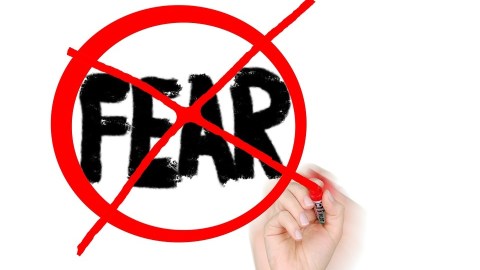Why Has 2015 Felt Like a Year of Fear, if We’re So Safe?

It was a fearful time. Murderous foreign terrorists were attacking with increasing frequency, slaughtering anyone they could. Their targets couldn’t be predicted. Defense seemed impossible. No one, and nowhere, felt safe. It seemed like this could be the most frightening time people had ever faced.
It was the early 800s in Northern Europe. The terrorists were Scandinavian Vikings.
Fear was everywhere. International travelers had brought home a horrible exotic new disease against which no one was immune. Victims bled and vomited and went mad with high fevers. No treatment worked. Everyone felt vulnerable, like this was one of the scariest times in which people had ever lived.
It was 1348. The disease was the Plague.
Dramatic changes in the weather around the world were literally threatening survival; unprecedented droughts in some areas, floods and storms in others. Temperatures changed so much that in vast regions crops couldn’t grow. Food shortages led to riots and anti-government revolts. Hundreds of thousands of migrants left their homes in search of somewhere they could survive. For millions around the world this certainly was the most frightening time humans had ever faced.
It was 1816, the Year With No Summer, after the eruption of volcanic Mount Tambora dramatically altered the entire global climate.
So here we are at the end of an unsettling year, and yet again many feel that these are among the most frightening times humans have ever faced. The threats seem to be piling up. One terrorist attack after another. Ebola. Droughts and floods and killer storms associated with climate change. Dozens of wars, and even the reawakened threat of nuclear holocaust. Desperate refugees fleeing violence and oppression, triggering waves of anti-immigrant xenophobia and hostility. And all of this on top of widespread general worries about the future as the economy leaves more and more people behind, and a sense that governments can’t protect public health and safety because they’ve grown so corrupt or unable to act because of political polarization.
It has, in many ways, felt like a Year of Fear. Despite how safe we actually are.
We are living longer than ever. Progress has lifted billions out of poverty and hunger. The overall rate at which humans are killing other humans is at an all-time low. But the rationalists who cite these statistical realities and poo poo our paranoia are too, well, rational. Fear that sometimes exceeds the actual threat is the unavoidable product of a cognitive system designed first and foremost to survive, not to be the smartest kid in class or the best at objectively figuring things out. Job One for your brain from the moment you wake up is to get you and your genes safely to bed. We are biologically hardwired to be on constant alert for any signal of potential threat, protected by a subconscious warning system that operates on instinct and emotion and mostly beyond the control of conscious reason.
What’s more, we are hardwired to overdo fear. The cognitive psychologists call this Loss Aversion — giving extra emotional weight to the prospect of loss; loss of money, of property, or health and safety. As a result of this basic precautionary instinct, we worry about lots of things more than the evidence says we need to. Yes, this can seem irrational, and yes, it can lead to choices and behaviors that are bad for us; the divisive racism of fearing all Muslims as terrorists, arming ourselves to the teeth whenever we’re afraid (at least in the United States), or just generally worrying so much that our health suffers in profound ways because of the biological effects of persistent stress.
But despite the dangers our emotion-based risk-perception system can cause, this seemingly irrational system persists because it works. Excessive worry may get us in trouble from time to time, but a default that favors precaution helps keep us alive. We tend to see the dark side in danger because that protects us.
So sure, the statistical likelihood of being a victim of terrorism or mass murder is infinitesimal, and Ebola can’t spread without physical contact, and yes, modern medicine and cleaner food and water and modern technology have given us longer lives and greater opportunities for a better quality-of-life than ever. But against those rational truths lies a system of risk perception based largely on affect and instinct that tends to see danger around every corner.
That’s why we so readily abandon our morality and turn into bigots when we are afraid. It’s why we fear Ebola more than the flu. It’s why some of us are more afraid of guns than cars, which kill four times as many people in the U.S. as are shot to death. It’s why politicians, and businesses, and the news media, have been and always will be able to succeed by appealing to fear.
And our precautionary risk-perception system explains why across history humans have so frequently felt like the times they’re living in are the most dangerous times humans have ever faced. We don’t consciously think about the bigger picture and how good things are overall. We are predisposed to pay more attention to what threatens us. And we don’t compare the present to the past. We only care about what threatens us, now.
We should fight to keep this in check, and reason can help. Careful objective thinking can also help us stay safe. It can even help us recognize the mistakes we sometimes make when we worry too much, or not enough, and minimize those mistakes
But there is only so much conscious control we can exert over our powerful instinctive survival system. Worry is just a part of who we are. Now go and have a safe new year. Odds are you will.
Image; GettyImages, Kinson C Photography





